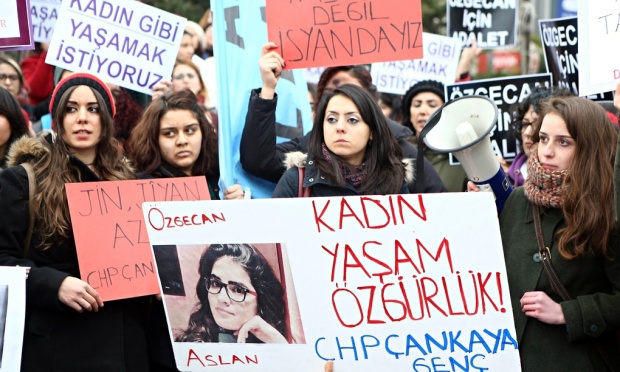Elif Shafak
As a high-school student in Turkey, whenever I took the bus I would make sure to keep an open safety pin in my hand – to poke molesters with. By the time I started university, I was carrying pepper spray in my bag, as did many of my female friends. We spoke about these things among ourselves, quietly. Today, Turkey’s women are publicly sharing stories of sexual harassment, opening up and speaking out. We are worried. We are mourning. At the same time, we are angry.
It all started when Ozgecan Aslan, a 20-year-old psychology student in the southern province of Mersin, was found dead in a riverbed. After an attempted rape, she had been stabbed to death and then burned. The murderer, the driver of the minibus Aslan was last seen taking, confessed to the crime. He was aided by a friend and his 50-year-old father.
Aslan’s brutal murder unleashed an unprecedented storm of protest throughout Turkey. The head of the Mersin bar association announced that none of the 1,600 lawyers licensed to work in the region would represent the murderer and his accomplices. University students dressed head to toe in black and women went to work wearing black ribbons.
In her hometown of Mersin, Aslan’s funeral was attended by thousands of women. According to the understanding of Islam prevalent in Turkey, women stay at the back of the funeral crowd and let the men carry the coffin and lead the prayers. This time it was different. Despite repeated warnings from the imam, women refused to step back and said they were determined “no other man’s hands would touch her again”. Women carried her coffin. Women buried her.
Women’s bodies and lifestyles have turned into an ideological battleground
Women’s advocacy groups have for years been warning the government about the sharp deterioration in gender equality and freedoms. But for the most part their voices have fallen on deaf ears. In the past 10 years the number of gender-related homicides has tripled in Turkey. Between 2003 and 2013 domestic violence has increased more than 1,400%. In the Global Gender Gap report Turkey ranks 125th among 142 countries. It still holds the lowest position among OECD countries.
The AKP replaced the Ministry of Women and Family Affairs with the Ministry of Family and Social Policy. The renaming, seemingly small, is rather telling: the word “women” has been taken out and the emphasis has been placed on “family”. While visiting a maternity hospital in January, the minister of health, Mehmet Müezzinoğlu, said a woman’s primary career was motherhood and that Turkish women should focus only on this career. The statement provoked a major backlash.
Even though a new law to “protect family and prevent violence against women” was enacted in 2012, few concrete steps have so far been taken to provide actual financial, psychological or social aid to abused women. A panic-button project, which was introduced with much fanfare, has proven to be ineffective. There are still fewer than 100 shelters in the entire country. Women’s NGOs say the number should be at least 7,500.
Speaking at a political rally, the prime minister, Ahmet Davutoğlu, vowed to launch a new campaign to make sure this kind of violence is eradicated. President Erdoğan has spoken out about Aslan’s murder, saying: “I will personally follow the case so that they [the perpetrators] will be given the heaviest penalty. I am already following the case.” But at the same time several AKP members have made incendiary statements, adding insult to the injury. The head of the Human Rights Investigation commission, Ayhan Sefer Üstün, went as far as to declare that “killing the baby in the mother’s womb is a greater crime than the deeds of the rapist”.
There are two main factors behind the government’s poor handling of the situation. Firstly, it is, structurally and ideologically, just like many other political parties in Turkey past and present, deeply patriarchal. Turkey has one of the lowest rates of female representation in politics.
Turkey president: violence against women is the country’s bleeding wound
Read more
Secondly, the AKP has so sharply estranged itself from one half of its people that it now doesn’t know how to collaborate with women’s advocacy and civil society groups. But gender violence is such a widespread and deeply rooted problem that it can only be improved via efforts that transcend ideological lines. Turkey, however, is so deeply politicised and polarised that no one is willing to do that.
In the meantime, a social transformation is taking place. A change that many analysts, focused primarily on politics rather than culture, are failing to notice. Turkey’s women are becoming more openly politicised than its men. Half of the protesters at the Gezi park demonstrations were women. In social media most of the critical campaigns are led by women. Women’s bodies and lifestyles have turned into an ideological battleground.
President Erdogan slammed the women who protested against domestic violence and sexual harassment in Turkey for singing songs and dancing together. In the pro-government newspaper Yeni Safak, some columnists have said that rape also happens in America and therefore people should shut up about it. Another columnist argued “keep quiet and go to a doctor”.
Just like the society they come from, Turkey’s women are divided. Not as Turks and Kurds. Not as Muslims and non-Muslims. Not even as conservatives and secularists. From now on the biggest rift will be between those who defend silence and the status quo, and those who refuse to keep quiet in the face of growing gender violence.





